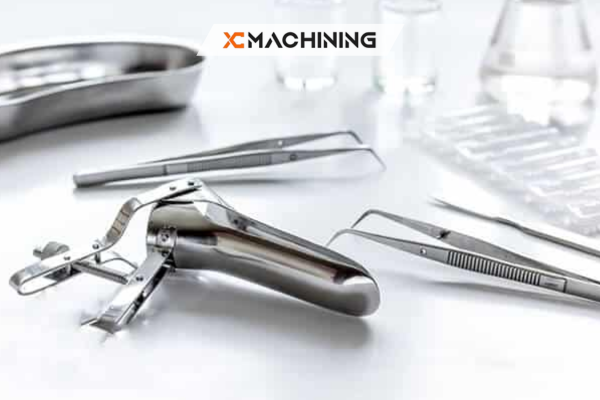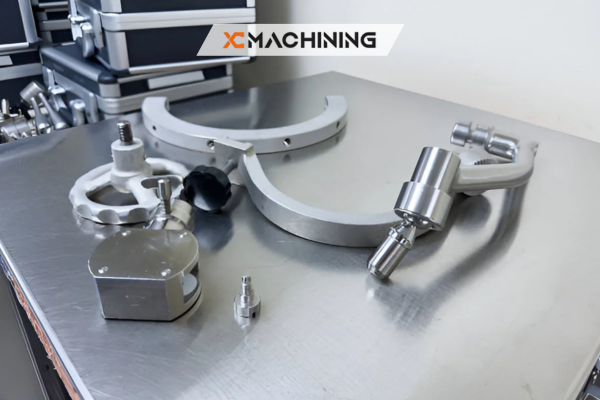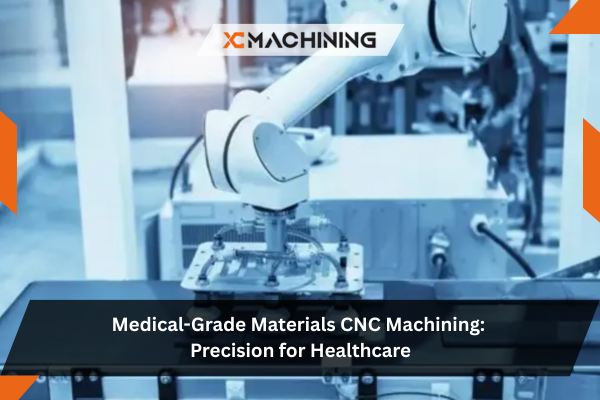The healthcare industry demands nothing less than perfection. When surgical instruments enter operating rooms, when implants integrate with human tissue, or when diagnostic equipment analyzes critical specimens, the materials comprising these devices must meet extraordinary standards for biocompatibility, strength, sterility, and reliability. CNC machining has become the manufacturing method of choice for producing medical devices from specialized materials that satisfy these rigorous requirements. Understanding medical-grade materials for CNC machining—their properties, selection criteria, processing considerations, and regulatory implications—enables manufacturers, engineers, and healthcare professionals to make informed decisions that ultimately impact patient safety and treatment outcomes.
Table of Contents
Understanding Medical-Grade Materials
Before exploring specific materials for CNC machining in healthcare applications, it’s essential to understand what qualifies a material as “medical-grade.” This designation encompasses several critical characteristics beyond the material’s basic mechanical properties.
Biocompatibility represents the fundamental requirement—materials must not provoke adverse biological responses when contacting body tissues or fluids. The ISO 10993 series of standards establishes testing protocols evaluating cytotoxicity, sensitization, irritation, systemic toxicity, and other biological responses. Materials passing these rigorous tests earn biocompatible status for specific applications and contact durations.
Sterilization compatibility ensures materials withstand repeated sterilization cycles without degradation, dimensional changes, or property deterioration. Medical device CNC machining must consider how autoclave steam (121-134°C), ethylene oxide gas, gamma radiation, or electron beam sterilization affects material performance throughout the device’s service life.
Chemical resistance matters because medical devices encounter cleaning agents, disinfectants, body fluids, and pharmaceutical compounds. Materials must resist degradation from these chemical exposures while maintaining dimensional stability and mechanical integrity.
Mechanical reliability requires consistent performance under cyclic loading, impact forces, and varying temperature conditions. Medical CNC machining produces components that must function flawlessly through thousands or millions of use cycles without failure that could endanger patients.
Regulatory compliance mandates that materials used in medical device CNC machining meet FDA requirements in the United States, EU MDR in Europe, or equivalent regulations in other markets. Comprehensive documentation tracing material sources, processing history, and quality verification becomes essential for regulatory approval.

Metals: The Foundation of Medical CNC Machining
Metal materials dominate medical CNC applications requiring structural strength, durability, and long-term implantation. Understanding the properties and applications of common medical-grade metals helps guide material selection.
Stainless Steel Alloys
Stainless steel represents the most widely used metal in medical CNC machining due to its excellent combination of strength, corrosion resistance, biocompatibility, and cost-effectiveness.
316L Stainless Steel: The “L” designation indicates low carbon content (maximum 0.03%) improving weldability and reducing carbide precipitation that can compromise corrosion resistance. This austenitic stainless steel offers excellent biocompatibility for short to medium-term implants and permanent external devices.
Common applications for 316L in medical CNC:
- Surgical instruments (scissors, forceps, retractors, scalpel handles)
- Orthopedic fixation devices (bone screws, plates, intramedullary rods)
- Dental instruments and temporary implants
- Cardiovascular stents and guidewires
- Medical equipment housings and structural components
316L machines well with appropriate tooling and cutting parameters. Its tendency to work-harden during machining requires sharp tools, positive rake angles, and adequate cutting speeds preventing excessive heat buildup. Medical CNC turning operations produce millions of bone screws annually from 316L bar stock, while milling creates complex surgical instrument geometries.
17-4 PH Stainless Steel: This precipitation-hardening martensitic stainless steel provides higher strength than 316L through heat treatment after machining. The combination of excellent corrosion resistance, high tensile strength (up to 1,400 MPa after heat treatment), and good machinability makes 17-4 PH valuable for applications requiring exceptional mechanical properties.
Medical CNC machining utilizes 17-4 PH for orthopedic instruments subjected to high forces, surgical power tool components, and precision medical equipment parts where strength and wear resistance matter most.
Titanium and Titanium Alloys
Titanium offers the ultimate combination of biocompatibility, strength-to-weight ratio, and corrosion resistance for implantable medical devices. Despite machining challenges and higher material costs, titanium’s exceptional properties justify its selection for critical applications.
Commercially Pure (CP) Titanium: Available in four grades (1-4) with increasing strength, CP titanium provides excellent biocompatibility and corrosion resistance. Grade 2 CP titanium represents the most common choice for medical applications, offering good formability and moderate strength.
Medical CNC applications for CP titanium:
- Dental implants and abutments
- Cardiovascular pacemaker housings
- Cranial plates and maxillofacial reconstruction
- Spinal fusion cages
- Surgical instrument tips requiring non-magnetic properties
Ti-6Al-4V (Grade 5 Titanium): This alpha-beta alloy containing 6% aluminum and 4% vanadium dominates surgical implant applications requiring maximum strength. With tensile strength approaching 900 MPa in annealed condition and exceptional fatigue resistance, Ti-6Al-4V enables lightweight, durable implants that integrate excellently with bone tissue through osseointegration.
Primary applications in medical device CNC machining:
- Hip and knee replacement components (femoral stems, acetabular cups, tibial trays)
- Spinal implants (pedicle screws, rods, interbody cages)
- Trauma fixation plates and screws
- Dental implant fixtures
- Surgical power tool components
Machining titanium alloys presents challenges that medical CNC operations must address. Titanium’s low thermal conductivity concentrates heat at the cutting edge, accelerating tool wear. Chemical reactivity with tool materials at elevated temperatures causes built-up edge formation and premature tool failure. Successful titanium machining requires:
- Reduced cutting speeds (typically 50-150 surface feet per minute)
- Sharp cutting edges maintained through frequent tool changes
- Abundant coolant flow removing heat and preventing thermal damage
- Climb milling techniques reducing cutting forces
- Rigid setups minimizing deflection and vibration
Despite these challenges, experienced medical CNC machining facilities routinely produce complex titanium components meeting the stringent tolerances and surface finish requirements that healthcare applications demand.
Cobalt-Chrome Alloys
Cobalt-chromium alloys provide exceptional wear resistance, corrosion resistance, and biocompatibility for applications where articulating surfaces experience millions of cycles. These alloys withstand the demanding tribological conditions in artificial joints where metal components slide against polyethylene, ceramic, or metal counterfaces.
CoCrMo (ASTM F75, F1537): This cast or wrought alloy contains approximately 28% chromium and 6% molybdenum, delivering hardness, wear resistance, and corrosion protection superior to stainless steel. Medical CNC turning and milling operations produce femoral heads, acetabular liners, and knee replacement components from CoCrMo requiring exceptional surface finish (often 8 Ra or better) for bearing surfaces.
Machining considerations for cobalt-chrome:
- Extreme work-hardening tendency requires aggressive initial cuts preventing excessive surface hardening
- Carbide tooling essential with appropriate coatings (TiAlN preferred)
- Lower cutting speeds than steel (60-120 SFM typical)
- High rigidity setups controlling deflection from significant cutting forces
- Specialized grinding operations often required for ultra-smooth bearing surfaces
Aluminum Alloys
While not suitable for implants, biocompatible aluminum alloys serve medical CNC applications in equipment housings, instrument handles, and diagnostic device components where light weight, thermal conductivity, and corrosion resistance matter.
6061-T6 Aluminum: General-purpose medical equipment housings, imaging device components, and non-critical instrument parts.
7075-T6 Aluminum: Higher strength applications including surgical power tool housings and portable equipment requiring lightweight structural integrity.
Aluminum machines rapidly with excellent surface finish capabilities, making it economical for CNC medical equipment components requiring complex geometries without demanding the biocompatibility necessary for body contact.
Engineering Plastics: Versatility for Medical Applications
Medical-grade plastics expand design possibilities for medical CNC machining, offering transparency, flexibility, chemical resistance, and sterilization compatibility unattainable with metals. Understanding materials for CNC machining in the polymer category enables optimal material selection.
PEEK (Polyetheretherketone)
PEEK represents the premium engineering thermoplastic for medical applications, offering an exceptional combination of mechanical properties, biocompatibility, and sterilization resistance. This semi-crystalline polymer withstands repeated autoclave cycles, exhibits excellent chemical resistance, and provides strength approaching some metals while remaining radiolucent (transparent to X-rays).
Medical applications for PEEK CNC machining:
- Spinal fusion cages replacing traditional titanium designs
- Cranial reconstruction implants
- Orthopedic trauma plates and screws
- Dental healing abutments
- Surgical instrument handles requiring repeated sterilization
- Medical device housings requiring biocompatibility
PEEK machines beautifully with proper techniques despite its toughness. Sharp carbide tools, moderate cutting speeds, and adequate chip evacuation produce excellent surface finishes and maintain tight tolerances. Medical CNC operations increasingly specify PEEK for implants where radiolucency enables post-operative imaging without metal artifacts obscuring healing assessment.
Ultem (Polyetherimide – PEI)
Ultem provides excellent heat resistance (continuous use to 170°C), exceptional strength, and inherent flame resistance making it valuable for medical equipment and sterilizable components. This amorphous thermoplastic offers transparency in natural grades while maintaining rigidity and chemical resistance.
Common medical CNC machining applications:
- Surgical instrument housings and handles
- Sterilization trays and medical device packaging
- Fluid handling components in diagnostic equipment
- Autoclavable laboratory equipment
- Medical device prototypes before transitioning to production materials
Polysulfone (PSU) and Polyethersulfone (PES)
These transparent, heat-resistant thermoplastics withstand repeated steam sterilization while maintaining clarity and dimensional stability. Medical device CNC machining utilizes polysulfone family materials for applications requiring visibility of internal components combined with sterilization durability.
Applications include:
- Surgical suction and fluid handling components
- Autoclavable syringe components
- Medical device housing requiring internal visibility
- Membrane filtration housings in dialysis and pharmaceutical processing
- Sterilization-resistant medical equipment components
Acetal (Delrin/POM)
Acetal homopolymer provides excellent dimensional stability, low friction, and good mechanical properties for medical applications not requiring implantation. While not suitable for long-term body contact, medical-grade acetal serves numerous device applications.
Medical CNC turning and milling applications:
- Insulin pen mechanisms and dose adjustment components
- Surgical instrument internal mechanisms
- Medical device assembly fixtures
- Laboratory automation components
- Drug delivery device parts
Medical-Grade UHMWPE
Ultra-high molecular weight polyethylene serves a critical role in orthopedic implants as the bearing surface articulating against metal or ceramic femoral heads in hip replacements and against femoral components in knee arthroplasty. While often compression molded rather than machined, secondary CNC machining operations refine dimensions and create mounting features.
Material Certification and Traceability
Regulatory requirements demand comprehensive material documentation for medical device CNC machining. Mill test reports (MTRs) certify chemical composition and mechanical properties, tracing each lot to original production. Medical CNC facilities maintain detailed records linking finished devices to specific material lots, enabling recall traceability if quality issues emerge.
Material suppliers providing medical-grade stock must maintain quality systems meeting ISO 13485 or equivalent medical device standards. Certificates of conformance document regulatory compliance and biocompatibility testing results.
Processing Considerations for Medical-Grade Materials
Successfully machining medical-grade materials requires attention to contamination prevention, tool selection optimization, cutting parameter development, and surface finish achievement.
Contamination Control
Medical applications cannot tolerate contamination from cutting fluids, tooling, or environmental sources. Medical CNC operations implement:
- Dedicated equipment for medical work preventing cross-contamination from industrial materials
- Medical-grade cutting fluids or approved alternatives
- Cleanroom or controlled environment machining for critical components
- Post-machining cleaning protocols using validated processes
- Documentation verifying cleanliness levels meet specifications
Optimized Cutting Parameters
Each material requires specific cutting speeds, feed rates, and depths of cut optimizing tool life while achieving required surface finish and dimensional accuracy. Medical CNC machining facilities develop proven parameter sets for each material-application combination, documenting these in manufacturing instructions ensuring consistent results.
Surface Finish Requirements
Medical applications often specify surface finishes critical to performance. Implant bearing surfaces may require 8 Ra or better minimizing wear particle generation. Surgical instrument functional surfaces need specific roughness profiles ensuring proper tissue interaction. Medical device CNC machining achieves these demanding finishes through:
- Multi-pass finishing strategies gradually reducing roughness
- Sharp, properly coated cutting tools
- Optimized cutting parameters balancing speed and surface quality
- Post-machining processes including polishing, electropolishing, or surface treatments when necessary
Regulatory Considerations in Material Selection
Material selection for medical CNC machining must consider regulatory requirements throughout the device development process. FDA premarket notification (510(k)) or premarket approval (PMA) submissions require comprehensive biocompatibility data, material specifications, and processing validation. European MDR compliance demands similar documentation with additional clinical evidence requirements.
Material changes after initial approval trigger regulatory notifications and potentially extensive revalidation. This reality encourages thorough initial material selection considering long-term availability, supplier stability, and supply chain reliability alongside technical performance.

Emerging Materials and Future Trends
Medical CNC machining continues adopting advanced materials as research validates their safety and performance:
Porous titanium structures: Additive manufacturing creates porous titanium constructs, with secondary CNC machining refining interfaces and mounting features. Porosity encourages bone ingrowth, improving implant fixation.
Bioresorbable polymers: Materials like PLLA and PLGA gradually dissolve in the body, eliminating permanent hardware. CNC machining produces bioresorbable screws and plates for fracture fixation.
Antimicrobial materials: Silver-impregnated plastics and copper-bearing alloys provide inherent antimicrobial properties, reducing infection risks in implanted and external devices.
Graphene-enhanced polymers: Incorporating graphene nanoplatelets improves mechanical properties and wear resistance, expanding capabilities of medical-grade plastics machined through conventional CNC processes.
Quality Assurance for Medical-Grade Material Machining
Medical CNC operations implement comprehensive quality systems ensuring consistent results:
First article inspection: Complete dimensional verification of initial production parts establishes process capability before full production.
In-process monitoring: Statistical process control tracks critical dimensions throughout production runs, detecting trends before parts exceed specifications.
Material verification: Positive material identification (PMI) using X-ray fluorescence or optical emission spectroscopy confirms material identity, preventing mix-ups that could cause catastrophic failures.
Cleanliness verification: Particle counts, residue analysis, or bioburden testing confirm cleaning process effectiveness.
Documentation and traceability: Comprehensive records link finished devices to material lots, processing parameters, inspection results, and personnel involved, enabling complete traceability for regulatory compliance and quality investigations.
Conclusion
Medical-grade materials CNC machining represents the intersection of advanced materials science, precision manufacturing technology, and rigorous quality systems, all focused on the singular goal of patient safety and treatment effectiveness. The diverse palette of materials for CNC machining in healthcare—from titanium alloys and cobalt-chrome bearing surfaces to PEEK implants and Ultem instrument housings—enables medical device manufacturers to optimize material selection for each application’s unique requirements.
Success in medical CNC machining requires far more than technical competence in CNC machining metal materials or polymers. It demands comprehensive understanding of biocompatibility requirements, sterilization compatibility, regulatory expectations, and quality system rigor that healthcare applications absolutely require. Material selection must balance mechanical performance, biological safety, manufacturing feasibility, and economic reality while maintaining unwavering focus on patient outcomes.
As medical technology advances, medical device CNC machining will continue evolving with new materials, refined processing techniques, and enhanced quality verification methods. The fundamental principles—biocompatibility, dimensional precision, material integrity, and comprehensive documentation—will remain cornerstones of medical manufacturing regardless of technological progress. Understanding these principles and the materials that embody them empowers manufacturers, engineers, and healthcare professionals to make informed decisions that ultimately improve patient care and advance medical science.
FAQs Related to Medical-Grade Materials CNC Machining
1. What are the top materials used for medical CNC machining?
The preferred medical-grade materials CNC machining, such as titanium, stainless steel, cobalt-chrome, and PEEK, are selected because they are strong and biocompatible.
2. Medical-grade Materials CNC machining CNC machining safe for use in the medical field?
Not at all. Only select biocompatible metals for implants that meet clinical safety standards.
3. What makes CNC machining the choice of many in the medical field?
The qualities of high precision, reproducibility, and customization serve to make CNC machining excellent for making complex equipment needed in healthcare.
4. How important are a tool’s material properties for its use in surgery?
The material properties in surgical tools impact durability, safety, and sterilization. Make sure the metal you choose is hard, not easily corroded, and that it is not poisonous.
5. How should I check that my CNC supplier follows medical standards?
Look for partners with ISO 13485 certification, FDA registration, cleanroom capabilities, and experience in medical-grade materials CNC machining.





